Origin Genesis Review: Triple Titan Terror
by Ryan Smith on April 23, 2013 9:00 AM ESTApplication and Futuremark Performance
Though our Genesis system is primarily intended for gaming, with gaming being such a resource-intensive hobby it tends to follow that the Genesis is also an incredibly high performer at virtually everything else. The 4.9GHz SNB-E processor is as fast as they come right now, and with the triple Titans and RAID-0 SSDs backing it up, it’s clear there are very few computers that will come anywhere close to the Genesis.
As such our standard application and Futuremark benchmarks are here mostly because they’re obligatory. We simply haven’t reviewed any prior systems, even other SNB-E systems, that are as powerful as the Genesis. It takes the top spot in everything.
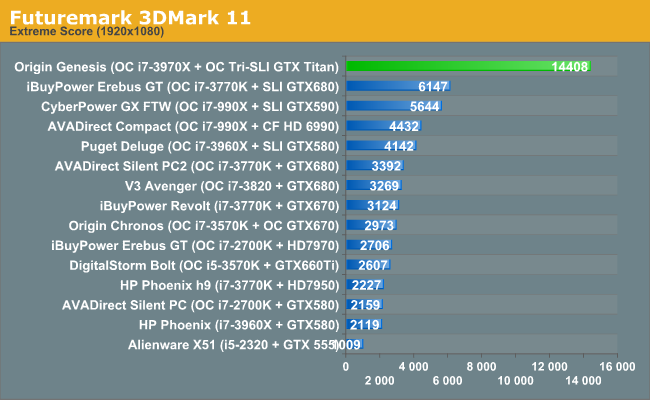
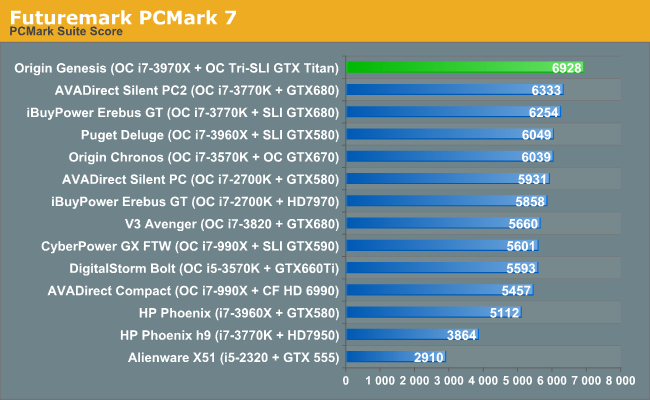
The Genesis more than doubles the 3DMark performance of the next-fastest system we’ve reviewed, an overclocked IVB + GTX 680 SLI configuration. Meanwhile the PCMark scores are much closer since most of the PCMark score is determined by CPU and storage performance rather than GPU performance, but thanks to the hefty overclock on its i7-3970X processor, the Genesis is still almost 700 points ahead of the next-closest system.
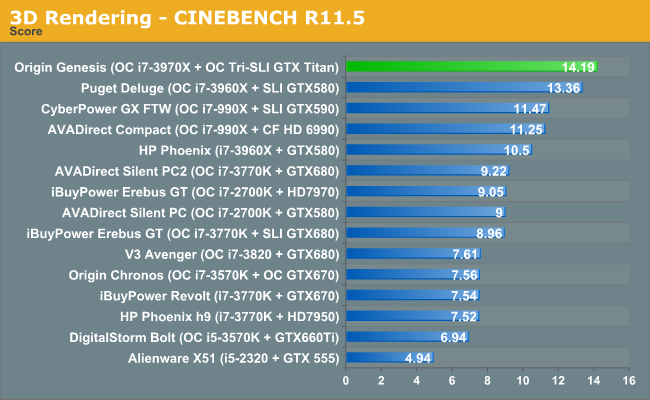
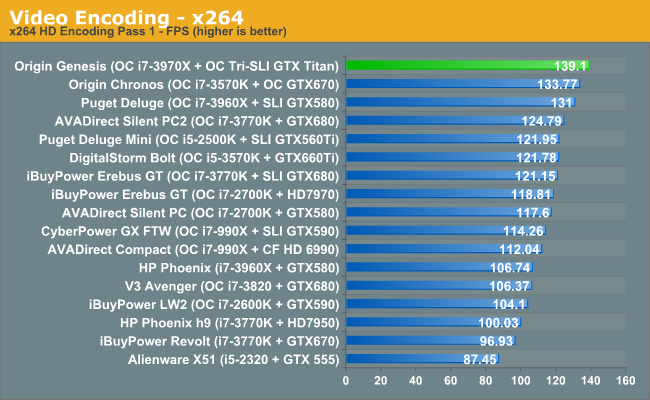
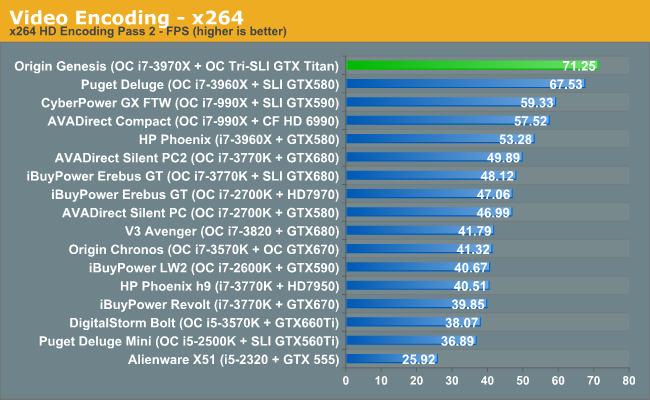
Diving into our CPU-dependent benchmarks, the story is much the same. Thanks to the CPU overclock, the 4.9GHz SNB-E processor means the Genesis pushes past even other SNB-E systems in both Cinebench and x264 encoding. At this point the Genesis is approaching the limit for what any kind of single-socket consumer system is going to be able to achieve.
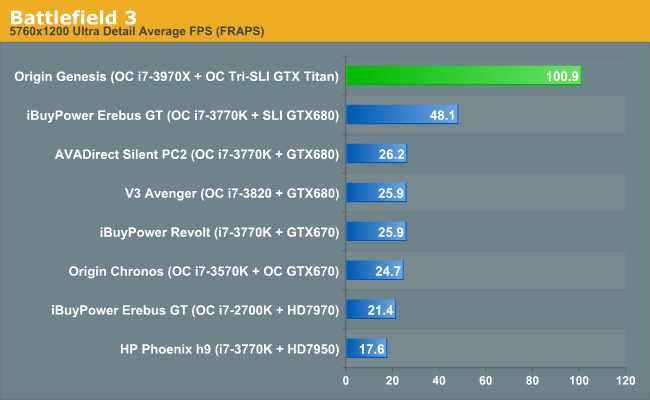
Finally, we’re throwing in one of our standard gaming benchmarks before going into tri-SLI Titan’s performance in-depth. Even at 5760x1200 with Ultra settings, Battlefield 3 is hard-pressed to keep 3 Titan cards occupied, with the Genesis delivering 100fps. 3D Surround BF3, anyone?










63 Comments
View All Comments
Pontius - Tuesday, April 23, 2013 - link
Ryan, a question for you:I remember that on the first Titan review, it said nVidia did not have OpenCL support in their Titan drivers and that they were working on fixing whatever issues they were having. Do you know if they have since released a driver that supports OpenCL? If not, do you have any info on a target date? If so, will you be benchmarking this (or other) Titan systems with OpenCL?
Thanks.
Ryan Smith - Tuesday, April 23, 2013 - link
Yes, OpenCL support has since been fixed for Titan. We have the results in bench and you should see them in other articles soon enough.Pontius - Tuesday, April 23, 2013 - link
Awesome, thanks!Pontius - Tuesday, April 23, 2013 - link
BTW, Bench appears to be completely broken. No matter what I select to compare, it keeps taking me back to the main CPU bench page.Ryan Smith - Wednesday, April 24, 2013 - link
D'oh.I'll get the web devs on it in the morning. Thank you for pointing that out.
Footman36 - Tuesday, April 23, 2013 - link
120gb SSD, no dedicated sound card and a case that can only accept 120x3 at the top is not going to cut it. Too loud, too hot. Why not use the new Corsair 900. Even though it is not yet available I am sure that Origin could have waited. It will retail at around $350 so not much more than the 800 and has room for 4x120 at the top, 3 x 120 at the front 4 x 120 bottom side and 1 x 140 at the back. Much more sensible cooling options. Would have handled the heat output better reducing load temps and noise. I have GTX 670's in SLI and 3770K all overclocked with a single 140 rad at the back and a triple 120 at the top of my Switch 810, so Origins cooling leaves me meh! And all this for the price of a cheap car! No thanks.7Enigma - Tuesday, April 23, 2013 - link
Ryan,I've seen this before in case reviews and it always confuses (annoys) me. You mention that the manual fans on high are loud, and you post values for the noise at 66% under load, but you don't post the TEMPERATURES of the CPU/GPU at that 66% load. Saying, "At these speeds the Genesis still has plenty of airflow for just about everything, but we would not recommend replicating our 1340W load testing at anything less than full speed since it was at these settings that we hit 81C under full load.", is just not very helpful. We want to know @66% are you now getting close to the limit of components when playing the most demanding game in your arsenal? What about the hard drive, ram, optical drive, etc. that now has to deal with hotter internal temperatures (especially because the top fans have now been forced to work against physics).
I just feel that when numbers are cherry-picked or not fully disclosed (low temps at high fan speeds, and low noise at low fan speeds) a potential buyer doesn't have much helpful REAL WORLD usage and the manufacturer gets put in a better light.
Great review otherwise, I just want to see those extra data points!
Ryan Smith - Tuesday, April 23, 2013 - link
The short answer is no, component temperatures don't get too bad when gaming at 66%. The GPUs never exceeded 62C, and the CPU never exceeded 75C. As for the other components, the SSDs and HDD are in their own bay; the only things of note cooled by the primary chamber are the VRMs and RAM, and the latter doesn't have temperature probes.7Enigma - Wednesday, April 24, 2013 - link
Thank you for the data! Any way you could put that in one of the tables above (or at least mention it in the gaming section)? And do that in the future if similar fan options are allowed?teiglin - Tuesday, April 23, 2013 - link
You accidentally claimed that there are 2000 square meters of silicon in this thing on the power/temps page; that'd be a pretty stunning amount of microchip!